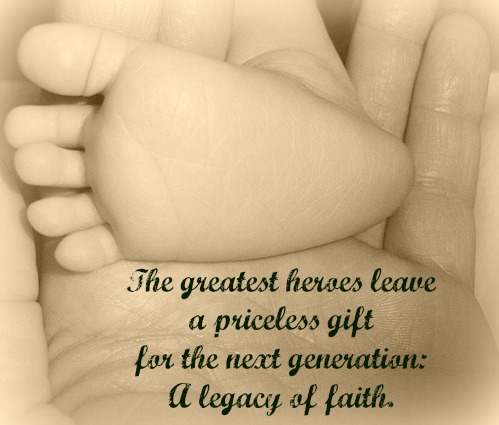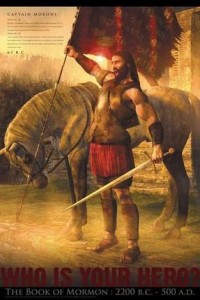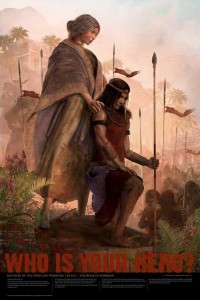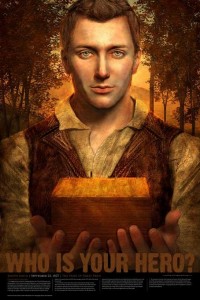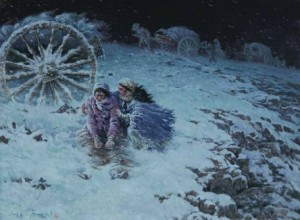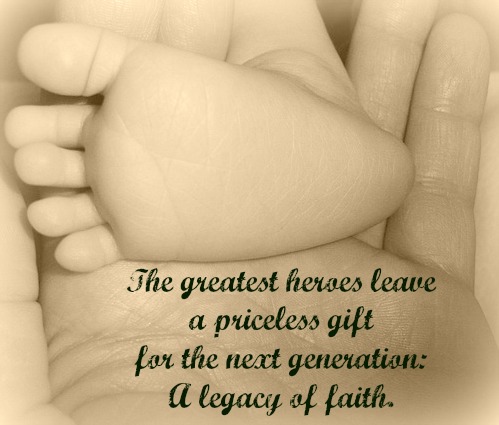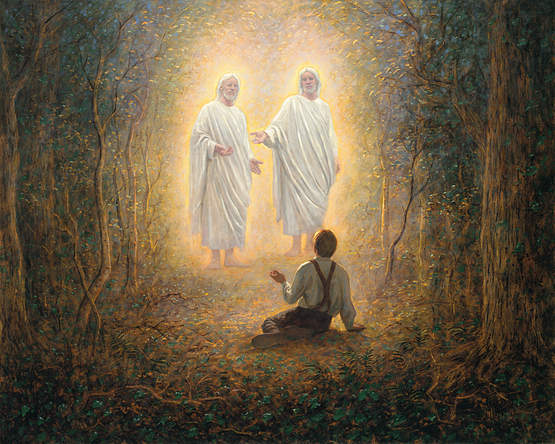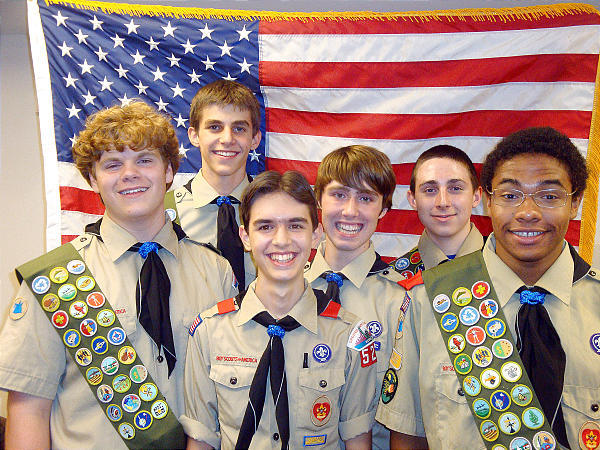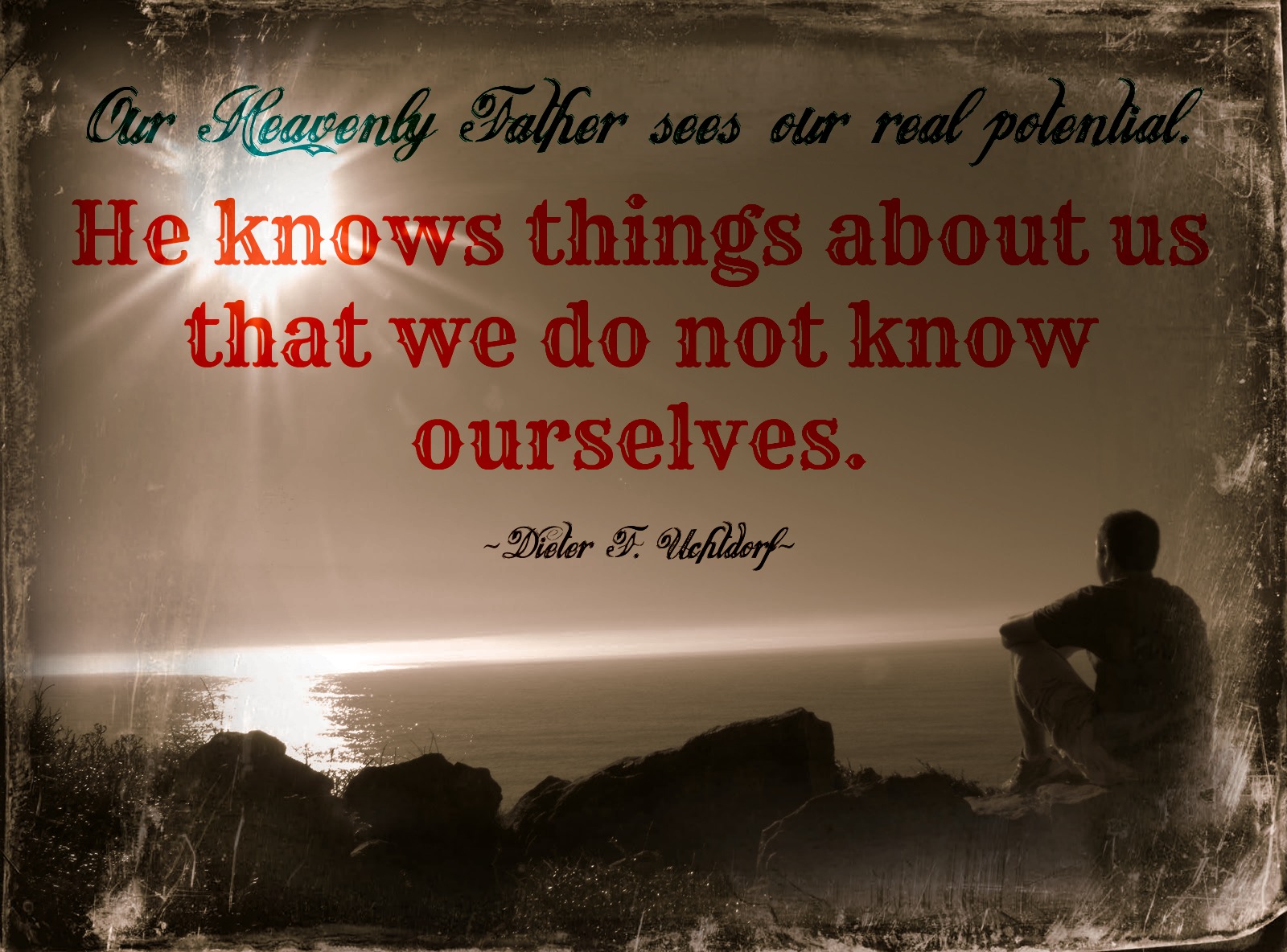A true hero is a person who inspires us, who makes us want to be better. Heroes are personal, and we each connect with our own heroes in our own ways. For me, a true hero is human. We see how the hero overcame human weakness and frailty—and we realize that we, too, can triumph. President Dieter F. Uchtdorf, the second counselor in the First Presidency (with the Quorum of the Twelve Apostles, the governing body of The Church of Jesus Christ), said:
Isn’t that what we all desire: to be the heroes and heroines of our own stories; to triumph over adversity; to experience life in all its beauty; and, in the end, to live happily ever after? …
Sandwiched between their “once upon a time” and “happily ever after,” they all had to experience great adversity. … The scriptures tell us there must be opposition in all things, for without it we could not discern the sweet from the bitter. Would the marathon runner feel the triumph of finishing the race had she not felt the pain of the hours of pushing against her limits? Would the pianist feel the joy of mastering an intricate sonata without the painstaking hours of practice?
In stories, as in life, adversity teaches us things we cannot learn otherwise. Adversity helps to develop a depth of character that comes in no other way. [1]
The depth of character forged in the fires of adversity is what makes a hero great. We look up to our heroes because we admire their courage and strength. We may face similar trials as our heroes, but we might not. The lessons we learn aren’t in the situations but in the way our heroes react to them.
Standing for Truth, Righteousness and the Cause of Freedom
The scriptures are full of stories of men and women who had the courage to stand for the right. Captain Moroni’s tale is found in the Book of Mormon—which is another testament of Jesus Christ, a companion scripture to the Bible and a record of God’s dealings with some inhabitants of the ancient Americas. Captain Moroni was a righteous military commander who led his people, the Nephites, in defense of their homes, their families and their freedom—first from invaders who would enslave them and then from one of their own who wanted to be king. When the enemy seemed too great to overcome, Moroni rallied his troops by reminding them that they were fighting for a just and righteous cause. (See Alma 43 and Alma 46.)
Captain Moroni’s greatness is not only in his military wisdom, but also in his unfailing commitment to God’s laws. Moroni never sought power, greatness or glory. He only wanted to protect his people, their families, their freedom and their ability to worship God according to their deeply held beliefs. The scriptures teach:
Moroni was a strong and a mighty man; … a man of a perfect understanding; … a man who was firm in the faith of Christ. …If all men had been, and were, and ever would be, like unto Moroni, behold, the very powers of hell would have been shaken forever; … the devil would never have power over the hearts of the children of men. (Alma 48:11, 13, 17)
Captain Moroni not only led his people into battle, but he helped to prepare them both physically and spiritually to defend against their enemies. Elder Richard G. Scott, an Apostle of Jesus Christ, said:
In between the many battles, Captain Moroni directed fortification of the weakest cities. … Captain Moroni understood the importance of fortifying the weak areas to create strength. [2]
This Book of Mormon leader isn’t just a hero for us today—he was a heroic leader for his people in his day as well. He not only stood up for what was right—but he rallied his troops to do the same. He was a hero, and he helped to create heroes. We only know Captain Moroni’s name, but those who followed his righteous example are heroes too. Through his courage, strength and inspiration, he helped to save an entire nation from destruction—multiple times.
Courage to Face our Foes—and Fears
The 2,000 Stripling Warriors are another group of heroes from the Book of Mormon. But the heroes in this story aren’t limited to those who fought in the battles. The story actually begins with the parents of the 2,000 young men—and they are contemporaries of Captain Moroni. Their Lamanite fathers had been wicked, bloodthirsty people. But then they and their families were taught the gospel of Jesus Christ and repented. They made a covenant with God to never fight again and buried their weapons of war. They also changed their tribal name as a symbol of their repentance. (See Alma 23:7, 13, 17.) The newly named Anti-Nephi-Lehies moved over to the land of the Nephites because the Lamanites were trying to kill them.
So, fast-forward. The Nephites are becoming exhausted after years of fighting. And the Anti-Nephi-Lehies want to help their protectors. But a man named Helaman (who becomes the leader of this band of young men) and others persuade them against this idea. The Anti-Nephi-Lehi fathers had many sons who had not made the covenant to not fight. These 2,000 young men said, in essence, “Dad, don’t go to war. You can’t break your promise to Heavenly Father. We didn’t make that promise. We will go in your place—to save your soul and protect your freedom.” The scriptures teach:
They were all young men, and they were exceedingly valiant for courage, and for strength… but behold this was not all—they were men who were true at all times in whatsoever thing they were entrusted. Yes, they were men of truth and soberness, for they had been taught to keep the commandments of God.” (Alma 53:20-21)
This story is inspiring on so many levels. To begin with, these young men loved their fathers so much that they were willing to go to battle for them—literally in their fathers’ place. Much is made of their heroism, as well it should. But the quiet heroes in this story are the fathers and mothers who trusted the Lord enough to allow their sons to go to war. I am certain there were many parental prayers offered. I can’t imagine allowing my sons to go war in my place. That must have been humbling. The scriptures teach us a little about the relationship between the sons and their parents:
They did think more upon the liberty of their fathers than they did upon their own lives; yea, they had been taught by their mothers, that if they did not doubt, God would deliver them. And they rehearsed unto me the words of their mothers, saying: We do not doubt our mothers knew it. (Alma 56:47-48)
None of these 2,000 young men were killed in battle, although many were wounded. They all made it back home. They were blessed because of their faith—and the faith of their mothers and fathers. The parents of the 2,000 Stripling Warriors set the example of righteousness and keeping their covenants with God. They taught their sons well, and their sons followed their example. Even though they lived in a time of war and uncertainty, both parents and children placed their trust in the Lord—and faced their foes and fears with faith.
Unwavering Obedience to God’s Commands
The early history of The Church of Jesus Christ in modern days has many heroes also. The founding prophet Joseph Smith and his wife, Emma, are at the top of that list. At the tender age of 14, on a spring day in 1820, young Joseph knelt in a grove of trees and prayed, asking God which church he should join. In answer to his humble petition, Heavenly Father and His Son, Jesus Christ, appeared to the young boy and told him not to join any of them. Through his powerful, simple faith, young Joseph received the answer to his prayer—in what is called today the First Vision. President Thomas S. Monson—the president of The Church of Jesus Christ and current successor to Joseph Smith—said:
A few days after his prayer in the Sacred Grove, Joseph Smith gave an account of his vision to a preacher with whom he was acquainted. To his surprise, his communication was treated with “contempt” and “was the cause of great persecution, which continued to increase.” Joseph, however, did not waver. He later wrote, “I had actually seen a light, and in the midst of that light I saw two Personages, and they did in reality speak to me; and though I was hated and persecuted for saying that I had seen a vision, yet it was true. … For I had seen a vision; I knew it, and I knew that God knew it, and I could not deny it.” Despite the physical and mental punishment at the hands of his opponents which the Prophet Joseph Smith endured throughout the remainder of his life, he did not falter. He taught honesty—by example. [3]
Joseph Smith is the prophet of the Restoration. Through him, Jesus Christ restored His Church to the earth and brought forth The Book of Mormon. Joseph accomplished many great things with the Lord’s help—but he was always a humble servant of God, seeking to do His will. Joseph was a kind and gentle soul. One of my favorite stories about the Prophet Joseph illustrates this:
Joseph Smith was as tenderhearted as he was sociable, as one young man remembered: “I was at Joseph’s house; he was there, and several men were sitting on the fence. Joseph came out and spoke to us all. Pretty soon a man came up and said that a poor brother who lived out some distance from town had had his house burned down the night before. Nearly all of the men said they felt sorry for the man. Joseph put his hand in his pocket, took out five dollars and said, ‘I feel sorry for this brother to the amount of five dollars; how much do you all feel sorry?’” [4]
Elder Robert D. Hales, an Apostle of Jesus Christ, said:
… The Prophet Joseph Smith endured all manner of opposition and hardship to bring to pass the desire of our Heavenly Father—the restoration of The Church of Jesus Christ of Latter-day Saints. Joseph was harassed and hunted by angry mobs. He patiently endured poverty, humiliating charges, and unkind acts. His people were forcibly driven from town to town, from state to state. He was tarred and feathered. He was falsely charged and jailed. …
Joseph knew that if he were to stop going forward with this great work, his earthly trials would probably ease. But he could not stop, because he knew who he was, he knew for what purpose he was placed on the earth, and he had the desire to do God’s will. [5]
Emma Smith was the faithful and devoted wife of the Prophet Joseph. She stood by his side through all of the trials and tribulations. One of my favorite stories of Emma occurs during a time when her husband had again been arrested and the Latter-day Saints were being driven from their homes in Missouri by angry mobs and relocating to Illinois:
For Emma Smith, the months after Joseph’s arrest were especially trying. In February 1839 a neighbor, Jonathan Holman, helped her place her four children and her meager belongings into a straw-lined wagon pulled by two horses. On the evening prior to her departure she received from Miss Ann Scott the priceless manuscripts of her husband’s “translation” of the Bible. James Mulholland, the Prophet’s secretary, had given the papers to Ann for safekeeping thinking that the mob might not search a woman. Ann had made two cotton bags to hold the documents. Emma used these same cotton bags to carry the manuscripts from Missouri to Illinois, tying them under her long skirt.
When the party arrived at the Mississippi they found the river frozen over. Rather than risk the weight of the wagon, Emma walked across the ice holding two children, with the other two clinging to her skirt. They finally arrived safely at the outskirts of the village of Quincy, Illinois, where Emma lived until Joseph’s release. [6]
Joseph and Emma Smith were faithful followers of Jesus Christ. They endured intense persecution and suffering, yet accomplished great things through their obedience to the gospel. Their examples of kindness and love toward others even when the times got tough are truly inspiring.
‘I’ll Go Where You Want Me To Go’
During the early years of The Church of Jesus Christ, the members were persecuted and forcibly removed from their homes and cities several times. Church leaders decided to relocate the entire body of Saints to the tops of the Rocky Mountains. It took much courage, faith and dedication to follow the leaders of the Church into the wilderness—but they did. The Latter-day Saints left their comfortable homes and most of their belongings, because they had faith in God and believed that The Church of Jesus Christ was the Savior’s Restored Church on the earth. The pioneer exodus began in 1847 but continued for many years. The majority of Latter-day Saint pioneers came in wagons, but some came in handcart companies. All of those early Latter-day Saint pioneers are heroic in their own right, but members of two notable handcart companies stand out for their sacrifice, their valor and their unwavering faith in God and in His goodness. The Martin and Willie Handcart Companies came across the plains in 1856. They left late in the season, but hoped to make it to the Salt Lake Valley before the snow fell. But they were caught in early winter snows in present-day Wyoming, and they ran so low on food and supplies that many were boiling leather to make a broth to eat. Their suffering was unimaginably severe. And yet, their heroism isn’t only in the fact that they endured these trials—it’s also that they endured these trials and through it all, thanked God for His goodness and blessings.
One survivor’s story tells it all, I think. The late President David O. McKay, a past president of The Church of Jesus Christ, recounted a story that occurred some years later. During a class at church, the teacher and others began sharply criticizing Church leaders in a discussion concerning the Martin and Willie handcart tragedy. President McKay continued:
An old man in the corner … sat silent and listened as long as he could stand it, then he arose and said things that no person who heard him will ever forget. His face was white with emotion, yet he spoke calmly, deliberately, but with great earnestness and sincerity.
In substance [he] said, “I ask you to stop this criticism. You are discussing a matter you know nothing about. Cold historic facts mean nothing here, for they give no proper interpretation of the questions involved. Mistake to send the Handcart Company out so late in the season? Yes. But I was in that company and my wife was in it. … We suffered beyond anything you can imagine and many died of exposure and starvation, but did you ever hear a survivor of that company utter a word of criticism? Not one of that company ever apostatized or left the Church, because everyone of us came through with the absolute knowledge that God lives for we became acquainted with him in our extremities.
“I have pulled my handcart when I was so weak and weary from illness and lack of food that I could hardly put one foot ahead of the other. I have looked ahead and seen a patch of sand or a hill slope and I have said, I can go only that far and there I must give up, for I cannot pull the load through it.” He continues: “I have gone on to that sand and when I reached it, the cart began pushing me. I have looked back many times to see who was pushing my cart, but my eyes saw no one. I knew then that the angels of God were there.
“Was I sorry that I chose to come by handcart? No. Neither then nor any minute of my life since. The price we paid to become acquainted with God was a privilege to pay, and I am thankful that I was privileged to come in the Martin Handcart Company.” (Relief Society Magazine, Jan. 1948, p. 8.)
The late President James E. Faust, who was an Apostle of Jesus Christ until his death, said:
I cannot help wondering why these intrepid pioneers had to pay for their faith with such a terrible price in agony and suffering. Why were not the elements tempered to spare them from their profound agony? I believe their lives were consecrated to a higher purpose through their suffering. Their love for the Savior was burned deep in their souls, and into the souls of their children, and their children’s children. The motivation for their lives came from a true conversion in the center of their souls. [7]
Elder M. Russell Ballard, an Apostle of Jesus Christ, said:
Those 19th-century pioneers … never set out to be heroes, and yet they accomplished heroic things. That is what makes them Saints. They were a band of believers who tried to do the right thing for the right reasons, ordinary men and women who were called on to perform an extraordinary work. [8]
The greatest heroes didn’t set out to be heroes—they just set out to do what was right. And in doing so they left a priceless gift for generations to come: a legacy of faith. Some heroes led, and some faithfully followed. Greatness isn’t measured by wealth, fame, prestige or prominence. Greatness is when ordinary people do extraordinary things—like remaining steadfast and true to the gospel of Jesus Christ no matter what the cost. True heroes inspire us to do better and to be better—because if they could do it, so can we. We may not put on our armor and fight—but we can fight for religious liberty. We may not go to battle for our parents—but we can honor them and recognize their sacrifices for us. We can take the lessons we learn from our heroes and apply them in our own lives, in our own day. That’s what makes a true hero—someone who is worthy of emulation as well as adulation. And that is the best gift that anyone can give.

